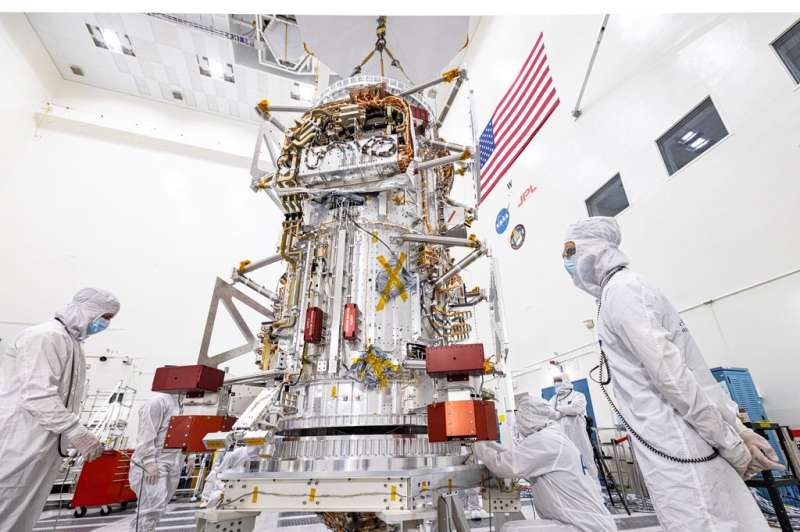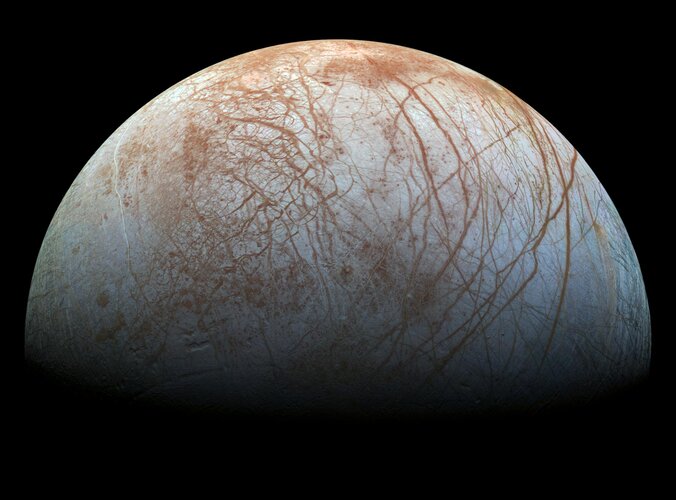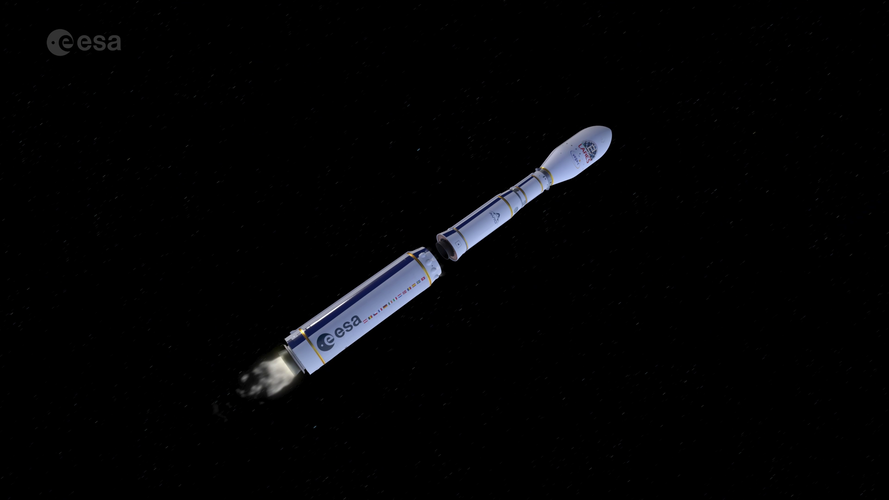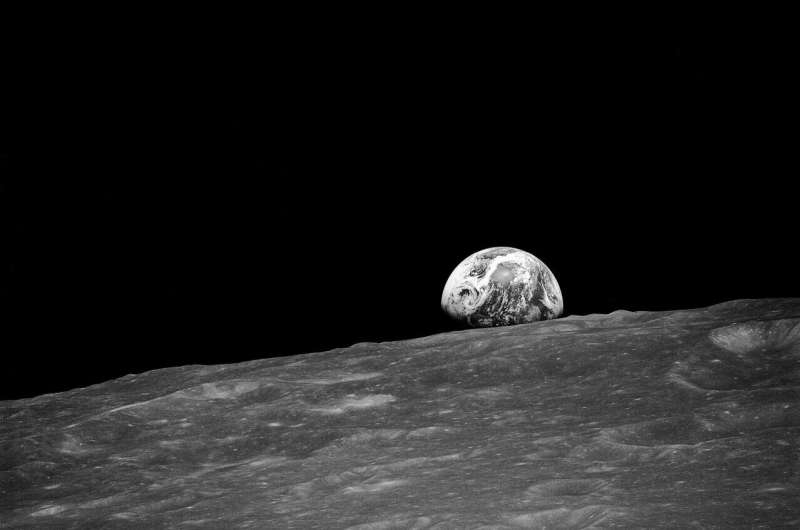
Copernical Team
French astronaut Pesquet calls for European space independence

French astronaut Thomas Pesquet on Tuesday urged Europe to seize the momentum created by its newfound diplomatic unity and "start moving now" to develop its own human spaceflight capacity.
The charismatic engineer and pilot, 44, recently completed his second deployment to the International Space Station on the NASA-SpaceX Crew-2 mission, and has arguably the highest profile among the European Astronaut Corps, in addition to being a celebrity in his native France.
Though he has long extolled international cooperation in space and remains in the mix to possibly go to the Moon as part of the NASA-led Artemis missions, Pesquet said it was vital for Europe's leaders to give the European Space Agency (ESA) the funding and mandate it needs to launch its own people, too.
NASA's Europa Clipper Mission completes main body of the spacecraft

The main body of NASA's Europa Clipper spacecraft has been delivered to the agency's Jet Propulsion Laboratory in Southern California. Over the next two years there, engineers and technicians will finish assembling the craft by hand before testing it to make sure it can withstand the journey to Jupiter's icy moon Europa.
The spacecraft body is the mission's workhorse.
Jupiter’s moon Europa to obscure distant star

On 19 June 2022, Jupiter’s intriguing moon Europa will pass in front of a distant star, making that star appear to disappear for at least a minute. This event will be easy to see with any size of telescope from certain parts of Africa.
Vega-C inaugural launch: mission highlights
 Video:
00:01:21
Video:
00:01:21
Animated preview of flight VV21 illustrates gantry rollout and liftoff from Europe’s Spaceport in French Guiana, stage and fairing separations, and deployment of the Italian Space Agency’s LARES-2 scientific payload and six research CubeSats. Vega-C represents a dramatic capability boost compared to its predecessor, Vega, which has flown since 2012. With new first and second stages and an uprated fourth stage, Vega-C increases performance from Vega’s 1.5 t to about 2.2 t in a reference 700 km polar orbit and handles larger payloads.
Bacterial cellulose enables microbial life on Mars
 An international research team including the University of Gottingen has investigated the chances of survival of kombucha cultures under Mars-like conditions. Kombucha is known as a drink, sometimes called tea fungus or mushroom tea, which is produced by fermenting sugared tea using kombucha cultures - a symbiotic culture of bacteria and yeast. Although the simulated Martian environment destroye
An international research team including the University of Gottingen has investigated the chances of survival of kombucha cultures under Mars-like conditions. Kombucha is known as a drink, sometimes called tea fungus or mushroom tea, which is produced by fermenting sugared tea using kombucha cultures - a symbiotic culture of bacteria and yeast. Although the simulated Martian environment destroye China sends three astronauts to Tiangong Space Station
 China on Sunday successfully launched a manned mission to its Tiangong Space Station.
The three-person crew launched on the Shenzhou-14 spacecraft from the Jiquan Satellite Launch Center in the Gobi Desert at 10:44 a.m. local time with the astronauts entering the Tianhe core module at 8:50 p.m.
The astronauts - Chen Dong, Liu Yang and Cai Xuzhe - will live and work in space for six m
China on Sunday successfully launched a manned mission to its Tiangong Space Station.
The three-person crew launched on the Shenzhou-14 spacecraft from the Jiquan Satellite Launch Center in the Gobi Desert at 10:44 a.m. local time with the astronauts entering the Tianhe core module at 8:50 p.m.
The astronauts - Chen Dong, Liu Yang and Cai Xuzhe - will live and work in space for six m NASA rolls SLS moon rocket back out to Kennedy Space Center launch pad
 NASA's Space Launch System moon rocket reached the launching pad at Kenndy Space Center in Florida Monday morning after its slow-rolling 4.2-mile hike.
The trip to the historic 39B launch pad, which finished up around 8:20 a.m. EDT, will allow the rocket to be loaded with super-cold propellants as it prepares for launch around the moon later this summer.
NASA's Space Launch System moon rocket reached the launching pad at Kenndy Space Center in Florida Monday morning after its slow-rolling 4.2-mile hike.
The trip to the historic 39B launch pad, which finished up around 8:20 a.m. EDT, will allow the rocket to be loaded with super-cold propellants as it prepares for launch around the moon later this summer. Shenzhou XIV astronauts transporting supplies into space station
 Crew members of the Shenzhou XIV spaceflight have begun to transport living and mission supplies to the Tiangong space station, according to the China Manned Space Agency.
The agency said in a short release on Monday afternoon that the three astronauts - mission commander Senior Colonel Chen Dong, Senior Colonel Liu Yang and Senior Colonel Cai Xuzhe - entered the Tianzhou 4 cargo spaceship
Crew members of the Shenzhou XIV spaceflight have begun to transport living and mission supplies to the Tiangong space station, according to the China Manned Space Agency.
The agency said in a short release on Monday afternoon that the three astronauts - mission commander Senior Colonel Chen Dong, Senior Colonel Liu Yang and Senior Colonel Cai Xuzhe - entered the Tianzhou 4 cargo spaceship Beautiful Weekend Views - Sols 3493-3495
 We're heading into a packed weekend, after a successful drive putting us in a great location with some really beautiful views. Everywhere you look in the Navcam mosaic (above) there's something interesting to see!
We're up close to a nifty layered outcrop, which is getting lots of imaging including ChemCam LIBS on targets 'Rukumata' and 'Guarico,' a ChemCam mosaic on 'Kamakusa,' MAHLI dogs
We're heading into a packed weekend, after a successful drive putting us in a great location with some really beautiful views. Everywhere you look in the Navcam mosaic (above) there's something interesting to see!
We're up close to a nifty layered outcrop, which is getting lots of imaging including ChemCam LIBS on targets 'Rukumata' and 'Guarico,' a ChemCam mosaic on 'Kamakusa,' MAHLI dogs Researchers tapped again for NASA moon mission, set to explore mysterious domes

A team of researchers from the University of Central Florida will be exploring an unknown and mysterious region of the moon.
Two UCF planetary scientists, Kerri Donaldson Hanna and Adrienne Dove, have been asked to lead a $35 million mission which would land a spacecraft over the Gruithuisen Domes—an unexplored part of the moon that has left NASA scientists scratching their heads, according to a NASA press release.
The domes, which are found on the western part of the moon, appear to be the result of a rare form of volcanic eruption, according to NASA. What's mysterious about the domes is that such geological structures on Earth require oceans of liquid water and plate tectonics to form. Without such ingredients, NASA scientists are left baffled as to how the structures came to be.
Donaldson Hanna and Dove's work is part of NASA's plan to use more commercial companies to take payloads to the moon through its Commercial Lunar Payload Service program (CLPS), which is headquartered in the Johnson Space Center in Houston. The CLPS program is born from NASA's Artemis lunar exploration plans and efforts to get humans back on the moon.

